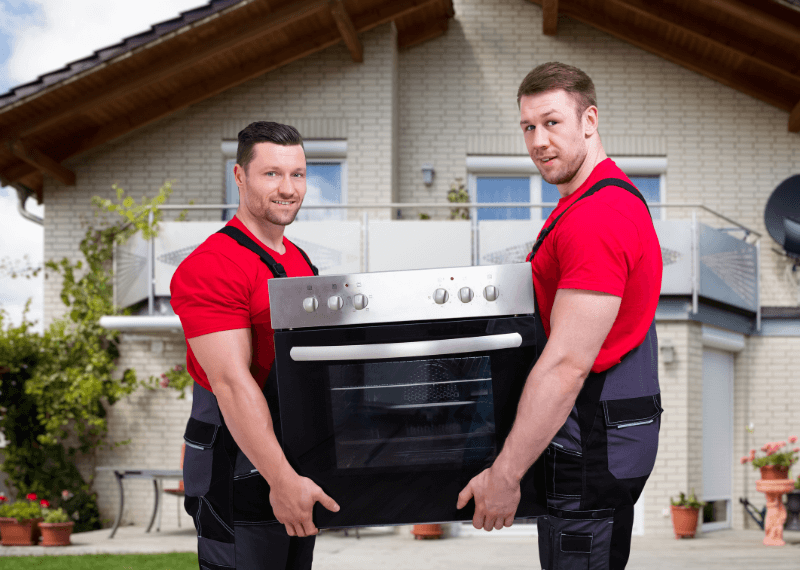This article was written to provide a step-by-step guide to moving the home, with a focus on the bigger appliances. We break it down appliance by appliance to help you learn the best way to pack them up without losing any parts.
Read on if you are considering a DIY move. Pricing Van Lines will help you find the cheapest moving deal in your area no matter what services you need.
Moving Appliances To Your New Abode
Moving appliances requires the right planning and tools to ensure safety and efficiency. It doesn’t help to save on moving your washer if you break it. Here’s a quick guide to moving big-time items by appliance type.
We break things down into three part, the preparation, the move itself, and pro moving tips from Pricing Van Lines top movers.
1. Refrigerator
- Preparation: Empty and defrost it at least 24 hours before moving. Try to eat up on the food or give it away on the days adjacent to the move. You can keep the very basics for the days of moving in a cooler or simply choose to eat out.
- Moving: Lock down the doors with duct tape and use a dolly for transport to save your back.
Tip: Keep the refrigerator upright to avoid damaging the compressor. The fridge has many intricate parts, and heavy items should not be stacked on it.
2. Washing Machine
- Preparation: Disconnect hoses and drain water. Secure the drum with shipping bolts. Tie the hoses to the washer to ensure no parts get lost during the move.
- Moving: Use a dolly for this big time heavy item and wrap the washer in blankets for protection from dents. Do not stack the washer with heavy items.
Tip: Label hoses for easy reinstallation. Even tape them to the spot they came from to avoid confusion.
3. Dryer
- Preparation: Disconnect and clean the vent. Clean out all lint and dust the dryer down.
- Moving: Use a dolly and tape the door closed. To prevent the hose and drawers from getting lost, tape them to the dryer itself.
Tip: Wrap the power cord to prevent tangling or loss.
4. Oven/Stove
- Preparation: Disconnect gas lines if you are using a gas stove and remove racks inside. Tape the rack to the oven to avoid losing it. Clean out the oven from any past spills so you can move a clean item into your new home.
- Moving: Use a dolly since the oven can be quite heavy and secure the oven door. For the stove clean off any debris and pack it inside padding.
Tip: Cover sharp edges to prevent injury. Do not touch the gas itself or disconnect any professional parts.
5. Dishwasher
- Preparation: Disconnect and drain. Make sure the water hose is drained before moving the dishwasher.
- Moving: Secure door with tape and wrap in blankets. Make sure the inner racks are secured.
Tip: Keep screws and parts in a labeled bag for easy re-assembly.
General Tips To Moving Big Items
Plan Ahead: Measure doorways and spaces to ensure a smooth fit. Think about angles you can tip your items to make sure the big pieces really will fit through those tight alleys and doorways.
- Ask for Help: Moving heavy appliances is easier with extra hands. If you aren’t sure you can handle the task alone, don’t even start. Enlist a friend or a professional mover for hte job.
- Use the Right Tools: A dolly, straps, and blankets make the process safer and more efficient. Don’t try and simply lift big items into the truck and hope for the best
- Create a Timeline: Make sure that your timeline is realistic and will allow you to finish the moving job on time.
- Safe Lifeting: Always lift with your legs, not your back. When moving heavy appliances, have one or two people to help. Communicate clearly to avoid mishaps.
- Before moving: Clear hallways, doorways, and any obstacles to create a clear path for moving the appliance directly into the truck.
- Label Everything: Including cords, hoses, and any parts that must be reattached. This makes reinstallation easier and simplified.
- Upon arrival: Carefully set up the appliance, ensuring all connections (water, gas, electricity) are secure before use.
Getting the Job Done
There are many ways to move homes. Whether you choose a DIY move where you handle your own appliance, simply plan to hire moving labor, or a full VIP move, Pricing Van Lines will get you there and get the job done at the most affordable rate on the market. If you aren’t sure moving all your own home is for you, don’t hesitate to reach out and check our our cheap and unbeatable rates.
Frequently Asked Questions
How do I help my dogs adjust to the difficulties of moving?
Pets pick up on our energy and vibes and need a common schedule. If you are stressed, you are likely to stress out your fluffy dog. Try and make the experience fun for them with lots of walks and treats. Associate the move with positive things your pet loves to make the day less hard for them.
Be sure to set up their home base as soon as you get into the new home so that they can feel they have their own corner with food, water, and bed. Try and send them to doggy daycare the day of the move to avoid stressing them out. Lots of treats and love is always the answer.
Where can I find cardboard boxes?
There are ways to purchase or simply find free cartons. Most movers are happy to deliver boxes for a fee when you book with them. You can also buy them at hardware stores. Another option is to go to major chain and grocery stores and request boxes from their daily deliveries for free. If you are shipping your items, you might even want to consider plastic cartons instead.
What is the smartest way to book a moving company?
Pricing Van Lines booking system is the top answer for this. If it’s a trusted and affordable mover you want for your family, only Pricing Van Lines offers such a wide range of local and cross-state moving companies that can be booked right here and now online. Not only can you book their services and lock down your date and time, but you can also get a quote taking the guesswork out of moving homes.
Is tipping my movers taken for granted by the team?
It isn’t always a given, but in today’s world, they will expect a tip for their work. They are hard workers helping you get from A to B. Tipping between 15-20% is expected by movers and drivers alike and is highly encouraged by our team at Pricing Van Lines. Think of it as if you’ve gone to a service provider and left without tipping- this is not ok in our society. Plan ahead for these costs so you aren’t surprised. Trust us.
How can I keep calm during my move?
When you book with Pricing Van Lines, you know you are taking a step in the right direction to keep your move calm, cool, and collected. When you are proactive about all the many tasks that need to be done, it is easier to keep calm. Keeping a list and organizing it by priority items to finish and giving due dates for each line item can be a good way to feel in control of the move rather than it is controlling you.




